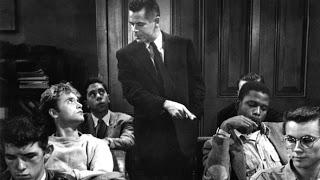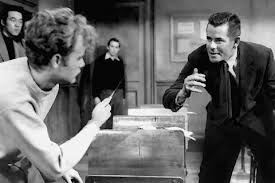
"Kids are people, and people are worthwhile."
Richard Brooks' Blackboard Jungle (1955) tackled the hot issue of juvenile delinquency. Its storyline and edgy content initiated cries for censorship; the movie was a hit regardless, thanks in part to Bill Haley's "Rock Around the Clock." Its grittiness aged far better than the same year's Rebel Without a Cause.Richard Dadier (Glenn Ford) becomes English teacher at inner city North Manual High School. He finds class a war zone: the students are insolent, the teachers indifferent or terrified. Dadier endures mockery, threats and actual violence while trying to teach. He finally connects with Gregory Miller (Sidney Poitier), a tough but gifted teen, but can't reach punk Artie (Vic Morrow). Despite his wife's (Anne Francis) insistence he quit, Dadier grows increasingly determined to succeed.
Blackboard Jungle marries an inspirational teacher story to a social message picture. Teachers make position speeches about poor salaries and glutted job markets; Dadier's colleague Jim (Louis Calhern) views kids as unruly, mindless monsters. Math teacher Joshua Edwards (Richard Kiley) loses his jazz records to unruly students; Artie's gang beats Dadier and frightens his wife with lewd phone calls. Their pranks are anything but harmless and troubled backgrounds don't excuse criminal behavior.
The social message format allows for uncommonly coarse content. A music teacher (Margaret Hayes) suffers attempted rape; one student gets a face full of glass. Brooks laces dialog with profanity and racial slurs, with Artie targeting Puerto Rican boy Morales (Rafael Campos) for particular abuse. There's a palpable, pervasive sense of menace, making North Manual less school than prison.

Blackboard Jungle would seem sensationalist if not for Brooks' steady, professional hand. He emphasizes New York's steaminess, with beatings in the shadows, a street robbery filmed through fog and relentlessly oppressive classrooms. He scores key scenes to rock and jazz music, punctuating disastrous lessons with jackhammer noise. Only later scenes clunk: Dadier's wife gives birth, a goon is dispatched with an American flag! Even this and a preachy monolog can't damage Blackboard's effectiveness.
Glenn Ford puts his natural rectitude to perfect use: grimly idealistic and self-doubting, it's among Ford's best roles. Sidney Poitier gives an intense, layered performance, even if it's hard to buy him as a teenager five years after No Way Out. Vic Morrow's punk is more predictably evil. Louis Calhern's hardened cynic and Richard Kiley's crushed idealist provide strong support, though Anne Francis is restricted to nagging wife duty.
Blackboard Jungle's basic format inspired a million urban teacher dramas, from Stand and Deliver to Dangerous Minds, which often founder from condescension and stereotypes. Brooks crafted a powerful drama whose urgency transcends not only its peers but its successors.

